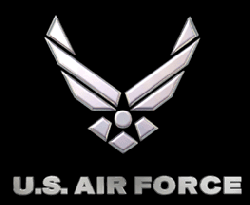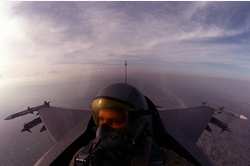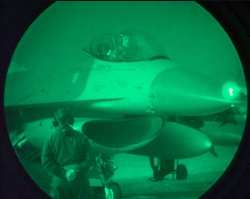 An Article 32 hearing beginning Jan. 13 will
investigate the charges against two F-16 Fighting Falcon pilots
involved in a "friendly fire" incident in Afghanistan last
year.
An Article 32 hearing beginning Jan. 13 will
investigate the charges against two F-16 Fighting Falcon pilots
involved in a "friendly fire" incident in Afghanistan last
year.
Majs. Harry Schmidt and William Umbach of the Illinois Air
National Guard's 170th Fighter Squadron face charges stemming from
an April 17 incident in which four Canadian soldiers were killed
and another eight injured at Tarnak Farms, near Kandahar,
Afghanistan.
Schmidt reportedly dropped a 500-pound bomb on the Canadians,
who were conducting night training. The hearing, directed by Lt.
Gen. Bruce Carlson, 8th Air Force commander, will be held at
Barksdale Air Force Base, La.
Schmidt is charged with four counts of involuntary manslaughter,
eight counts of assault, and dereliction of duty by failing to
exercise appropriate flight discipline and failing to comply with
the rules of engagement in Afghanistan. The charges were filed
under Articles 119, 128 and 92 of the Uniform Code of Military
Justice.
 Umbach
faces the same charges in addition to an allegation that he, as
flight commander at the time, failed to ensure that Schmidt
complied with the rules of engagement. According to Col. Craig A.
Smith, chief of the military justice division for the Air Force
Legal Services Agency at Bolling AFB, D.C., the military justice
system affords the two officers significant rights, many not
available in the civilian criminal justice system.
Umbach
faces the same charges in addition to an allegation that he, as
flight commander at the time, failed to ensure that Schmidt
complied with the rules of engagement. According to Col. Craig A.
Smith, chief of the military justice division for the Air Force
Legal Services Agency at Bolling AFB, D.C., the military justice
system affords the two officers significant rights, many not
available in the civilian criminal justice system.
"Every effort has been made throughout this entire matter to
ensure that impartial officers and commanders evaluated the
evidence against Majors Schmidt and Umbach," Smith said. "They have
been, and continue to be, represented by experienced Air Force and
civilian defense counsel, who will ensure that the rights
guaranteed to them by the U.S. Constitution, the UCMJ and the
Manual for Courts-Martial are protected."
On April 18, Gen. Tommy R. Franks, commander of U.S. Central
Command, directed an investigation board to convene to determine
the facts and circumstances of the incident. The board found the
cause of the incident to be failure of the two pilots to exercise
appropriate flight discipline, which resulted in violation of rules
and an inappropriate use of lethal force.
 The board also found that failures within the
pilots' immediate command structures were contributing factors, but
that they did not cause the incident.
The board also found that failures within the
pilots' immediate command structures were contributing factors, but
that they did not cause the incident.
On Sept. 11, Brig. Gen. Stephen T. Sargeant, the U.S.
co-president of the Coalition Investigation Board that investigated
the incident, preferred charges against Schmidt and Umbach. The
preferral of charges initiates the formal court-martial process,
which includes the upcoming Article 32 hearing.
According to military law, the convening authority may dismiss
the charges or continue the process by referring the charges to
court-martial.
"The Article 32 investigating officer will submit a written
report, with recommendations," Smith said. "General Carlson will
then determine how the charges will be handled. He may dismiss some
or all of them, forward the charges to a subordinate or senior
commander for disposition, or refer charges to a
court-martial."
Although the Article 32 hearing is similar to a civilian grand
jury proceeding, there are some important differences, Smith
said.

Article 32 hearings "differ in certain important rights afforded
to an accused that are not present in a civilian grand jury
proceeding," he said. "For example, a servicemember has the right
to be present at the hearing, to be represented by appointed
military defense counsel at the investigation, to request an
individual military defense counsel by name and hire a civilian
attorney at no expense to the government. The servicemember,
through his attorney, has the right to cross-examine witnesses
against him, and he may testify and call witnesses of his own."
The important thing to remember about an Article 32
investigation, Smith said, is that it is not a trial. "The primary
purpose of the Article 32 investigation is to investigate the
charges," he said. [ANN Thanks Master Sgt. Scott Elliott,
AFPN]
 ANN's Daily Aero-Term (04.30.24): Runway Centerline Lighting
ANN's Daily Aero-Term (04.30.24): Runway Centerline Lighting ANN's Daily Aero-Linx (04.30.24)
ANN's Daily Aero-Linx (04.30.24) Airborne 04.24.24: INTEGRAL E, Elixir USA, M700 RVSM
Airborne 04.24.24: INTEGRAL E, Elixir USA, M700 RVSM Airborne 04.29.24: EAA B-25 Rides, Textron 2024, G700 Deliveries
Airborne 04.29.24: EAA B-25 Rides, Textron 2024, G700 Deliveries Airborne-NextGen 04.23.24: UAVOS UVH 170, magni650 Engine, World eVTOL Directory
Airborne-NextGen 04.23.24: UAVOS UVH 170, magni650 Engine, World eVTOL Directory






